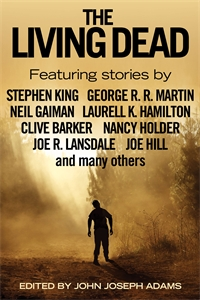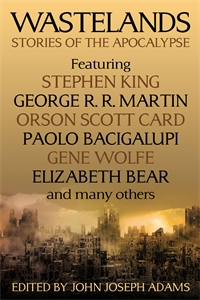Curiosity: The Hopkins Manuscript by R.C. Sherriff
My anthology, WASTELANDS: STORIES OF THE APOCALYPSE, contains most of my favorite examples of short-form post-apocalyptic fiction. And on the occasion of the UK release of WASTELANDS (and my zombie anthology, THE LIVING DEAD), Orbit asked me to provide a guest post, so I thought I’d tell you about a curiosity of long-form post-apocalyptic fiction that I discovered during the course of my research into the genre.
Discovered in the ruins of Notting Hill at some unspecified future date, The Hopkins Manuscript is ostensibly a “day-to-day record,” written by retired school teacher/chicken breeder/amateur astronomer Edgar Hopkins, which chronicles the days immediately before and after the shocking discovery that the Moon’s decaying orbit will bring it crashing down into the Earth.
Doom is prophesized, but the world is not destroyed as expected. Instead, the Moon strikes the Earth a glancing blow to the western coast of Europe . Being nothing more than a “hollow body with a thick crust,” it collapses and forms a new landmass that bridges Europe and the Americas, like a cosmic puzzle piece settling into place. Amicable plans are made by an international council to divide up ownership of this new land, but upon discovering that the Moon is not a lifeless rock—that instead it is rich in natural resources and possesses enough minerals “to give wealth to this world undreamed of”—the specter of war raises its ugly head in the immediate aftermath of the greatest cataclysm humanity has ever seen.
R.C. Sherriff (1896-1975)—a playwright, screenwriter, and novelist—is perhaps most remembered for his filmic collaborations with legendary Frankenstein (1931) director James Whale (1889-1957); the two worked together on several films, including an adaptation of Sherriff’s best-known play, Journey’s End (1930), The Invisible Man (1933), One More River (1934), and The Road Back (1937). In The Hopkins Manuscript, Sherriff presents a dark vision that is both a reflection on humanity’s attitudes in the aftermath of The Great War and a portent of things to come when one considers its publication date of 1939—the year World War II began. Though its science is obviously laughable, the novel remains thematically relevant and is an engaging read that I would highly recommend to anyone interested in seeing an historical view of the apocalypse through the literature of its time.
THE LIVING DEAD and WASTELANDS: STORIES OF THE APOCALYPSE are both now available as to buy digital-only editions in the UK, Australia and New Zealand.


